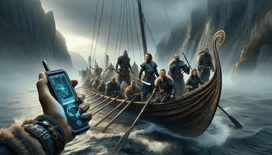Ah, the RMS Titanic. The big, unsinkable iceberg magnet. We all know how that story ends - spoiler alert, it wasn’t great for the ship. But what if, in a delightful twist of fate and a sprinkle of modern technology, the Titanic had been equipped with GPS? Would the so-called ship of dreams have had a second chapter added to its otherwise brief itinerary? Join me, your time-travelling tour guide, on this whimsical maritime journey of 'what if' and 'surely not'.
The Great GPS-olution
Now, GPS, or Global Positioning System, is the satellite-based technology that keeps us from admitting we’re lost. It’s the brainchild of 24 satellites orbiting Earth, sending their precise location data back to receivers below - think of it as a cosmic game of Marco Polo. On the Titanic, however, without the ducks, it would've been a game-changing tool.
Imagine Captain Edward Smith, stood on the bridge with a smartphone in hand, decked out in 'nautical chic' - cap slightly askew, iconic beard flowing, and thumbs expertly navigating Google Maps. A cheerful robotic voice whispers, "In 500 metres, avoid iceberg. Recalculating..."
A Sea Change in Navigation
In our hypothetical high seas scenario, Captain Smith finds himself not only confident but a tad overzealous perhaps. After all, would you worry about icebergs if you had onboard Wi-Fi and real-time updates stating, "No icebergs were harmed in the filming of this voyage"?
On that fateful night, Smith might have taken a slightly southern route around the massive ice block, or avoided it altogether, choosing a warmer, more coastal passage where the only dangerous chunk of ice is floating in your glass.
Unsinkable Public Opinion
With GPS on board, not only is the Titanic’s hull kept intact but public perception changes dramatically. This technological marvel, once dubbed "unsinkable," could now market itself as "un-loseable." The news clippings would read: "Titanic’s GPS Saves Day - Iceberg Left High and Dry!" Fans of the ship (there’s always mega-fans, you know) would rejoice and continue to buy overpriced memorabilia as a tribute to daring-do technology.
Captain Smith’s TripAdvisor Review
"Five stars. Would highly recommend the experience without any underwater detours. GPS was invaluable in ensuring a smooth sail. And the afternoon tea on deck was top-notch." Potential passengers flock to the liner, viewing the GPS-enhanced Titanic as the safest bucket list cruise.
Sailing Into Technological Waters
With the ship and all aboard saved, how would history judge this event? Would GPS technology usher in an era of innovation on the high seas much sooner, paving the way for real-time weather alerts and interactive ocean tours? A delightful possibility! We might see an amalgamation of marine wallflowers – like the Lusitania – outfitted with a cocktail of gizmos, bleeping and blooping their plucky way across the seven seas.
Echoes Through History
Consider this: the sinking of the Titanic heralded sweeping maritime changes, from lifeboat allocations to international ice patrols. An unsunk Titanic could forge an altogether different path, leaving transatlantic traffic bustling and the shipbuilding industry gripping onto traditional methods a little longer. Though, as an adventurer through time who cherishes surprise endings, it begs the question: Would we have learned enough from history’s lack of satellite intervention, or would Hydroboating Harry over here find another way to stick a cork in it?
The Conclusion: Smooth Sailing Ahead
Giving Titanic a GPS seems like a no-brainer but, as with all great "what ifs," it leaves more questions in its wake. Our curiosity may forever circle the drain when it comes to events like these, yet one thing's for certain: it's a tragedy more heart-warming than heart-wrenching to imagine Captain Smith, GPS-equipped and iceberg-averse, quietly muttering to himself, "I ship-shape, therefore I am."
So, dear reader, while we relish this salacious speculation, spare a thought for time-travelling Terry and his penchant for untangling history’s intricate web while asking the big questions. After all, when pondering what our history books might have looked like with a few more satellites whizzing overhead, we mustn’t overlook the power - and playful potential - of a well-placed "recalculating..."







